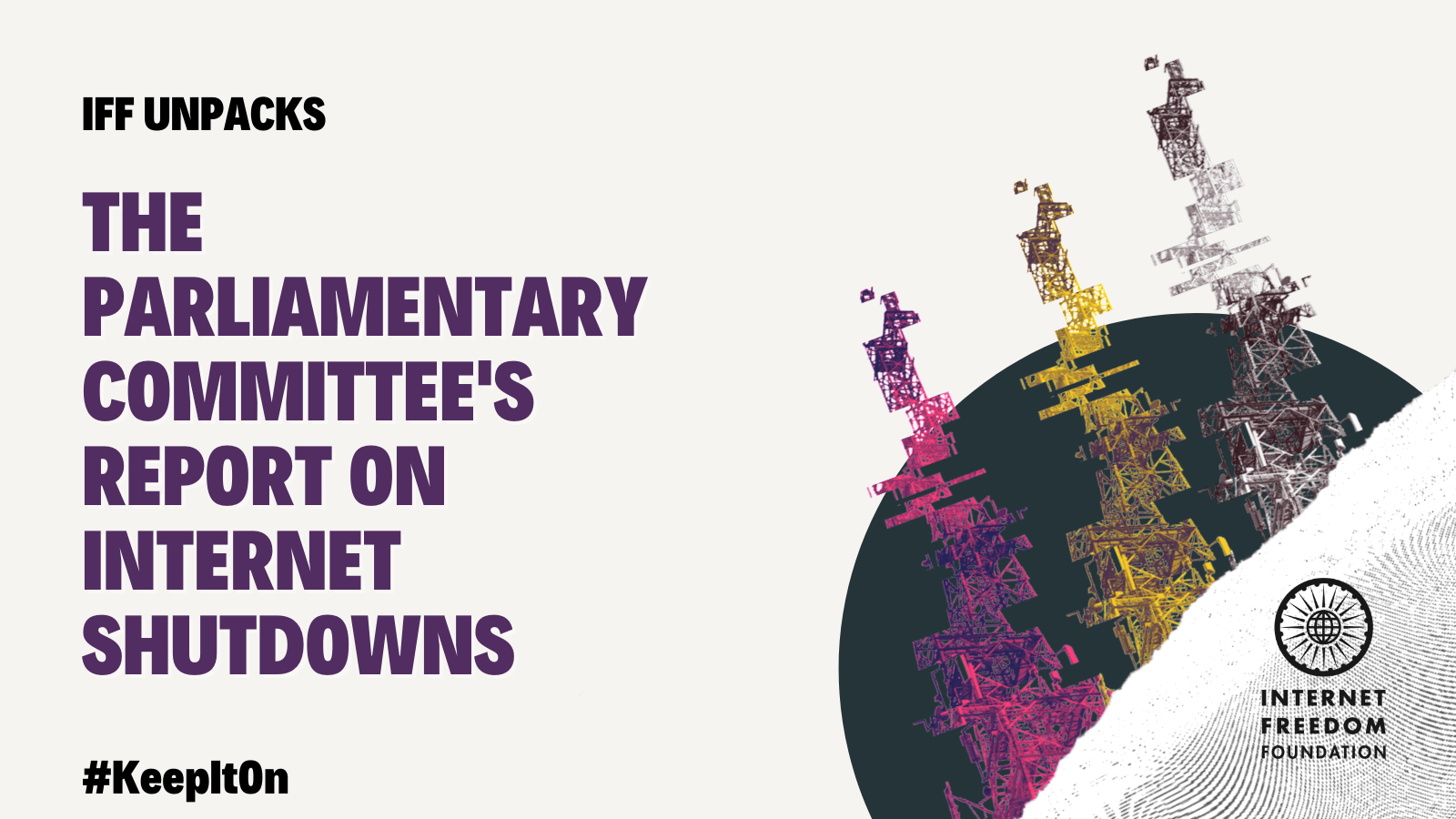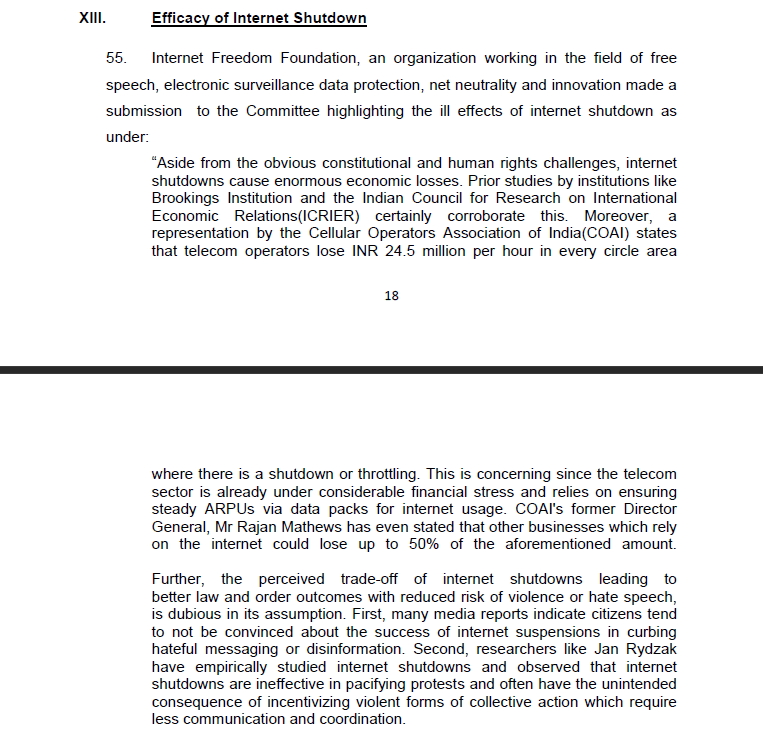
tl;dr
The Standing Committee on Communication and Information Technology has published its report on ‘Suspension of telecom services/internet and its impact’. The report has been published when governments across the country continue to frequently suspend internet services. In this background, the Committee has made a range of recommendations including a review of the legal regime for suspension of internet services and establishing a database of internet shutdown orders.
Introduction
In 2021, the governments in India, central and state, have suspended internet services for over 1108 hours. Last year, the internet was suspended for 8927 hours costing the country US$ 2.8 Billion (Rs. 20,937 crore). But the impact of such suspensions is not merely economic. Internet shutdowns are harmful because they prevent individuals from communicating with others, performing their professional responsibilities and accessing healthcare services, education and news. Considering the impact of internet shutdowns on modern society, the Hon’ble Supreme Court in Anuradha Bhasin vs Union of India, (2020) 3 SCC 637 held that internet suspension is a drastic measure and must be considered by the government only if necessary and unavoidable and after assessing the existence of less intrusive remedies. On several occasions, we have also written to governments (here, here, here, here, here, here, here, here, here, here, and here) seeking restoration of internet services, and compliance with the directions of the Supreme Court in Anuradha Bhasin.
Yet internet shutdowns remain the norm and not the exception, and continue to be imposed even if there is no apparent need. Recently in Udaipur and Jaipur, we observed that the internet was suspended to conduct exams, and in Haryana to clamp down on protests. Previously, in Jammu & Kashmir and Meghalaya internet was suspended without publishing the orders. All this is when the world is more reliant on the internet than ever before, and the Union Government has been pushing for digitization in all spheres of life.
In this background, on 1st December 2021, the Standing Committee on Communication and Information Technology (‘Standing Committee’) released its report on ‘Suspension of telecom services/internet and its impact’. On the same day, the report was also presented to the Lok Sabha and laid in the Rajya Sabha. The report summarises the legal regime to suspend internet services, criticises the frequent restrictions on the internet, and makes several recommendations which further individual rights.
Proceedings before the Committee
The Committee consists of Members of Parliament from across party lines. In 2019-20, the Committee had selected the subject for a detailed examination. However, the Committee could not complete the report in 2019-20 nor in 2020-21. In 2021, the Committee posed questions to the representatives from the Department of Telecommunications (DoT), Ministry of Home Affairs (MHA), State Government of Bihar and Union Territory of NCT of Delhi.
Amongst other things, the Committee enquired the authorities - 1) whether the Union Government maintains data of internet shutdown orders?; 2) whether provisions of Section 144 Code of Criminal Procedure, 1973 could be used to suspend internet services?; 3) whether ‘independent voice’ should feature in the review committees which examine whether internet suspension orders comply with the law?; 4) whether states have constituted review committees, and 5) whether it is feasible to selectively suspend services instead of ordering a shutdown?
In the report, the Committee has noted the responses of the authorities. Incidentally, the Committee has also noted the submissions made by IFF on 4th August, 2020 highlighting the ill effects of internet shutdowns. In our submissions, we had questioned whether internet shutdowns lead to better law and order outcomes, and had pointed out that research had demonstrated that internet shutdowns were ineffective in pacifying protests and have the unintended consequence of incentivising violent forms of collective actions which require less communication.

Recommendations
Based on an evaluation of the existing legal regime as well as submissions made by authorities in response to questions, the Standing Committee specified certain recommendations for a wide range of issues including regulatory overhaul, oversight mechanisms, transparency, and the need for consultations with stakeholders.
| Issue | Recommendation |
|---|---|
| Inadequacy of amendments to the Temporary Suspension of Telecom Services (Public Emergency or Public Safety) Rules, 2017 (‘Rules’) | In coordination with the MHA and the Ministry of Legal Affairs, the DoT must review the Rules in light of relevant Supreme Court judgements. Technological developments must also be taken into consideration. To this extent, the views of State governments may also be sought. |
| Grounds for suspending telecom services | A proper mechanism for evaluating the appropriateness of a shutdown must be implemented. Defined parameters on what constitutes a public emergency/safety may be specified to remove any ambiguity. |
| Need for central database on internet shutdowns | The DoT and the MHA must implement a centralised database of all internet shutdowns in the country. This database must include certain details about the shutdown including the duration, the reason for the shutdown and the reason the shutdown was ordered. |
| Clear regulatory framework | A robust mechanism must be implemented to ensure that State governments do not use section 144 of the Cr.P.C to initiate shutdowns. Appropriate action must be taken against state governments that deviate from the Rules. |
| Composition, Powers and functions of Review Committees | The composition of the Review Committee must be made more diverse by including more non-official Members such as retired Judges, Members of the public, etc The DoT may also explore the option of including local MPs and MLAs in the review committee. The DoT and the MHA should ensure that authentic data on the decisions taken by the Review Committee is maintained. |
| Constitution of Review Committee in all states | Review Committees must be constituted in all states to ensure adequate checks and balances The DoT must monitor the functioning of the Review Committees and maintain records for the same. |
| Safeguards against the misuse of internet shutdowns | The DoT and MHA must issue a uniform set of SOP and guidelines for the issuing of orders for suspension of telecom services. These guidelines must include the safeguards laid down by the Supreme Court in the Anuradha Bhasin judgement. |
| Effectiveness of internet shutdowns | A thorough study must be commissioned by the Union government to assess the impact of internet shutdowns on the Indian economy as well their effectiveness in dealing with public emergencies. Given the indispensable nature of the internet for modern India, Internet shutdowns must be used as a measure of last resort. |
| Telecom suspension regimes in other jurisdictions | The DoT must undertake a study of the regulatory framework adopted by other countries with respect to internet shutdowns. |
| Need for consultation with stakeholders | The DoT must lay down a mechanism for regular consultation with multiple stakeholders such as telecom service providers, elected representatives, peoples organizations, commercial/industry bodies, civil society, etc. so as to formulate a holistic policy relating to internet shutdown |
| Protecting citizens’ right to access the internet | The DoT and the MHA must ensure that the rights guaranteed under articles 19(1)(a) and 19(1)(g) that are exercised via the medium of the internet are not violated on grounds of public emergency. |
| Procedure for lifting internet shutdowns | The DoT, in coordination with the MHA and the Ministry of Legal Affairs, must lay down a clear principle of proportionality as well as the procedure for lifting internet shutdowns |
| Selective banning of services | The DoT must examine the TRAI’s recommendation and develop a policy to selectively ban OTT services with suitable technological interventions. Till such a policy is developed, efforts must be made to ensure interrupted services through state broadband networks which can be easily monitored. |
At the outset, we would like to thank the Standing Committee for listening to our submissions. We the recommendations, as we believe that they represent a genuine pathway towards a progressive regime for regulating internet shutdowns that factors in the importance of the internet for life in 21st century India. However, we are not in favour of the selective banning of services.We now urge the DoT, the MHA, and the Ministry of Legal Affairs to act on these recommendations, so that the scourge of arbitrary and excessive internet shutdowns can be defeated!
Important documents:
- The twenty-sixth Report of the Standing Committee on Communications and Information Technology on ‘Suspension of telecom services/internet and its impact’ tabled on on 1st December, 2021 (link)
- Representation to the Standing Committee on Communications and Information Technology Re: ‘Letter to consider a review of Temporary Suspension of Telecom Services (Public Emergency or Public Safety) Rules, 2017’ dated 4th August, 2020 (link)
